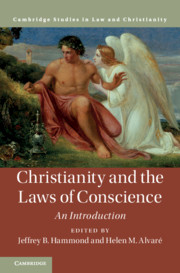Book contents
- Christianity and the Laws of Conscience
- Law and Christianity
- Christianity and the Laws of Conscience
- Copyright page
- Dedication
- Contents
- Contributors
- Acknowledgments
- Introduction
- Part I Themes in Understandings of Conscience in Christianity
- Part II Conscience According to Major Figures and Traditions
- 5 Conscience in the Early Church Fathers
- 6 St. Thomas Aquinas on Conscience
- 7 Reforming the Conscience
- 8 Toward a Theology of a Redeemed Conscience
- 9 Pierre Bayle
- 10 Freedom of Conscience and Its Right to Constitutional Protection
- 11 Jonathan Edwards on Conscience
- 12 Obeying God Rather Than Men
- 13 Mormonism and Conscience
- 14 Culture and Conscience in the Thought of Joseph Ratzinger, Pope Benedict XVI
- Part III Applied Topics in Law and Conscience
- Index
- References
9 - Pierre Bayle
An Enlightened Alternative to John Locke
from Part II - Conscience According to Major Figures and Traditions
Published online by Cambridge University Press: 12 June 2021
- Christianity and the Laws of Conscience
- Law and Christianity
- Christianity and the Laws of Conscience
- Copyright page
- Dedication
- Contents
- Contributors
- Acknowledgments
- Introduction
- Part I Themes in Understandings of Conscience in Christianity
- Part II Conscience According to Major Figures and Traditions
- 5 Conscience in the Early Church Fathers
- 6 St. Thomas Aquinas on Conscience
- 7 Reforming the Conscience
- 8 Toward a Theology of a Redeemed Conscience
- 9 Pierre Bayle
- 10 Freedom of Conscience and Its Right to Constitutional Protection
- 11 Jonathan Edwards on Conscience
- 12 Obeying God Rather Than Men
- 13 Mormonism and Conscience
- 14 Culture and Conscience in the Thought of Joseph Ratzinger, Pope Benedict XVI
- Part III Applied Topics in Law and Conscience
- Index
- References
Summary
Edward Andrew discusses Pierre Bayle, who held that conscience was the “voice of God,” but that humans can still err. Enlightenment thinkers increasingly insisted that social approval, not God’s voice, guided conscience. Thus, conscience became not about certainty concerning the right course of action, but rather about alignment with social forces that might create stability. Bayle maintained that conscience was a faculty of the person, although subject to error. This distinguished him from Locke, who referenced conscience in his political writings. However, in his Essay concerning Human Understanding, Locke asserted that conscience was only one’s abiding beliefs. Bayle, however, proposed that conscience was the development of applications of natural law and Scripture. Harold Schulweis and Harold Berman are conversation partners for Bayle. Schulweis sees conscience as a force of judgment outside law. Morality is not fixed; rather, the person with an active conscience constantly recalibrates her actions and judges the right thing to do. Berman, however, thought conscience as a force beside law, like a jury that renders its judgment about the right decision under the circumstances.
Keywords
- Type
- Chapter
- Information
- Christianity and the Laws of ConscienceAn Introduction, pp. 170 - 186Publisher: Cambridge University PressPrint publication year: 2021

